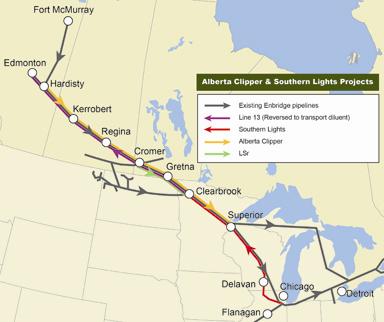Judge Rejects Bid to Block Alberta Clipper Pipeline Upgrade

MINNEAPOLIS (AP) — A federal judge rejected the key parts of a lawsuit brought by tribal and environmental groups that sought to block a capacity expansion on the Alberta Clipper crude oil pipeline, saying the courts don’t have the authority to intervene at this stage.
U.S. District Judge Michael Davis concluded Wednesday that the letters the State Department sent to Canadian-based Enbridge Energy weren’t the kinds of final decisions that courts have jurisdiction to review.
A coalition of tribal, environmental and climate change groups sued, saying the State Department should not have allowed Enbridge to build a temporary workaround to move more tar sands crude across the border pending the final federal approval. They said it threatens ecologically sensitive areas in northern Minnesota, and resources such as wild rice that are important to the area’s Ojibwe bands.
But the government countered that the State Department merely confirmed that Enbridge already had the legal authority to proceed under its existing permit.
“Obviously we’re disappointed in the decision, which essentially says the courts can’t help you,” said Ken Rumelt, an environmental attorney from the Vermont Law School, who represented the plaintiffs. He said they’ll consider whether to appeal after they’ve digested the judge’s opinion.
The plaintiffs, including the Sierra Club, issued statements saying that while the court may not have the authority to stop the project, President Barack Obama does. They noted that a fully expanded Alberta Clipper would carry more tar sands oil than the proposed Keystone XL pipeline, which Obama killed last month because it would have undercut U.S. efforts to achieve a global climate change deal.
“Now, just as he did with Keystone, President Obama can call for a full review of Enbridge’s plans and ultimately reject a pipeline expansion that would do irreparable harm to our climate, our environment, and our public health,” said Lena Moffitt, director of the Sierra Club’s Beyond Dirty Fuels Campaign.
The plaintiffs — including the National Wildlife Federation, 350.org and other groups — also pointed out a National Academy of Sciences released Tuesday that says heavy Canadian tar sands oil poses more environmental risks than conventional crude because it’s harder to clean up when it spills from pipelines into water.
The 1,000-mile Alberta Clipper, built in 2010, starts in Alberta, crosses into northeastern North Dakota and runs across northern Minnesota to an Enbridge terminal in Superior, Wisconsin. It follows the same route as Enbridge’s deteriorating Line 3, which dates from the 1960s and runs at reduced capacity.
Enbridge last year upgraded a stretch of Line 3 where it crosses the border, and built connections so it can serve as a detour to handle some of the flow from the Alberta Clipper. It plans to keep that arrangement in place until it gets State Department approval for expanding the capacity of a short section of the Alberta Clipper where it crosses the border.
Enbridge said in a statement that the court decision leaves the State Department’s existing approvals for the Alberta Clipper and Line 3 in place.
Related News
Related News

- Kinder Morgan Proposes 290-Mile Gas Pipeline Expansion Spanning Three States
- Valero Plans to Shut California Refinery, Takes $1.1 Billion Hit
- Three Killed, Two Injured in Accident at LNG Construction Site in Texas
- Tallgrass to Build New Permian-to-Rockies Pipeline, Targets 2028 Startup with 2.4 Bcf Capacity
- TC Energy Approves $900 Million Northwoods Pipeline Expansion for U.S. Midwest
- New Alternatives for Noise Reduction in Gas Pipelines
- EIG’s MidOcean Energy Acquires 20% Stake in Peru LNG, Including 254-Mile Pipeline
- Construction Begins on Ghana's $12 Billion Petroleum Hub, But Not Without Doubts
- DOE Considers Cutting Over $1.2 Billion in Carbon Capture Project Funding
- Valero Plans to Shut California Refinery, Takes $1.1 Billion Hit




Comments